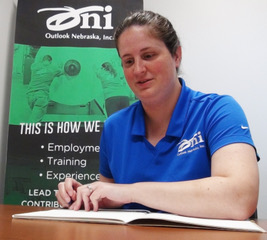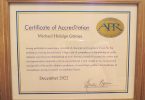
As professionals who are Accredited in public relations can attest, earning your APR credential isn’t an easy feat. At the very least, the process of Accreditation involves a commitment to studying, a strategic mindset and self-motivation.
Rachel Carver, APR, faced an additional challenge in earning her Accreditation: The PR and government-relations facilitator with Outlook Nebraska, Inc., was born blind. Yet her visual impairment did not hold her back from exploring Accreditation.
“I had been thinking about earning my APR for some time,” said Carver, who has been working in public relations for seven years. “I had read about it, and then received an email on the subject. Part of me thought it was going to be too hard, but I sat through a few webinars and was determined to earn it.”
Carver originally wanted to be a reporter. But after graduation she started with Outlook Nebraska, a nonprofit dedicated to positively impacting the blind and visually impaired through employment, adaptive technology training, and cultural and recreational programs.
“I learned the practice of public relations as I worked on the job, and thought Accreditation might help me more fully understand the fundamentals of the field,” she explained. “So I started to seek more information and set a goal.”
After discussing her APR goal with her supervisor and husband, Carver took the plunge and started the Accreditation process. It was far from easy.
New tech advantages
Carver has been completely blind since birth. At best, she can tell when lights are on and off, and she can make out a few shadows.
She reads Braille, but the APR study materials are not produced in Braille. Technology has made studying easier; she uses a computer with screen reading software to access PDF documents and create written materials such as the panel presentation questionnaire and portfolio. Her iPhone with VoiceOver allows her to check email, use Facebook and complete many other tasks similar to sighted users.
“Twenty years ago it would have been more of a challenge,” said Carver, reflecting on how she studied. “I would have probably needed to hire someone to read the material to me. But technology has really progressed. The screen-reading software allowed me to access all of the documents I needed to complete my panel presentation and study for the exam.”
Unfortunately, not all the study materials and “APR Bookshelf” were available in PDF or online versions. Carver said the textbook “Effective Public Relations” was her “holy grail,” but she had to scan the entire textbook, one page at a time because she could not find an e-version anywhere.
When she came across an unfamiliar concept, Carver didn’t focus on excuses; instead, she was committed to the process. She said it was similar to her college experience in that it took her more time and commitment than others.
“I always had to work a little harder — I just can’t pick up a book off the table and start reading like other people,” she said. “Part of earning the APR is that you have to really, really want it. If it was easy, everybody would do it.”
Ann Peru Knabe, Ph.D., APR+M, teaches public relations full time at the University of Wisconsin – Whitewater. She is also a colonel in the Air Force Reserve serving as a public affairs officer at the Pentagon, and owner of AK & Associates, a Milwaukee-based consulting firm that specializes in media training and crisis communication.
Earning Your APR: Rachel Carver’s Tips for Success
- Download the APR study guide before you apply. Start to familiarize yourself with the terms and concepts.
- Dedicate a time for studying, either alone or in a group session. (Carver studied after her son went to bed, and also dedicated Tuesday afternoons to the online course.)
- Consider the online course and leverage all of its features. (Carver took the Self Assessment quiz, downloaded notes before each module and printed them in Braille.)
- Develop a system to study concepts. (Carver used binders to organize topics for review like RPIE section, trademark, 1st amendment and business literacy)
- Engage with others going through same journey to stay motivated.
- Work with a mentor, coach or APR chair (Carver’s coach helped her improve her panel presentation and think more strategically)
- Find a method that works for you. Don’t be afraid to reach out to UAB or your APR chair. And if you have a disability, be sure to advocate for yourself – the UAB needs to know what you need to make accommodations.
For more information about the Accreditation in Public Relations process, visit www.praccreditation.org.







What an inspiring and helpful article. Way to go, Rachel!
Rachel, You are on a path to greatness! Keep it up. I have enjoyed the opportunity to with you and look forward to many more productive years!
Thank you for sharing your inspiring story, Rachel! I shall think of you while going through my APR journey.
Technology has come a long way and I admire your determination to stand strong and fight for what you truly desire and know you can achieve. Your drive and work ethic is something to look up to. I have a son born with a physical disability and I encourage him every day to do anything he puts his mind to. Thank you for sharing your story.